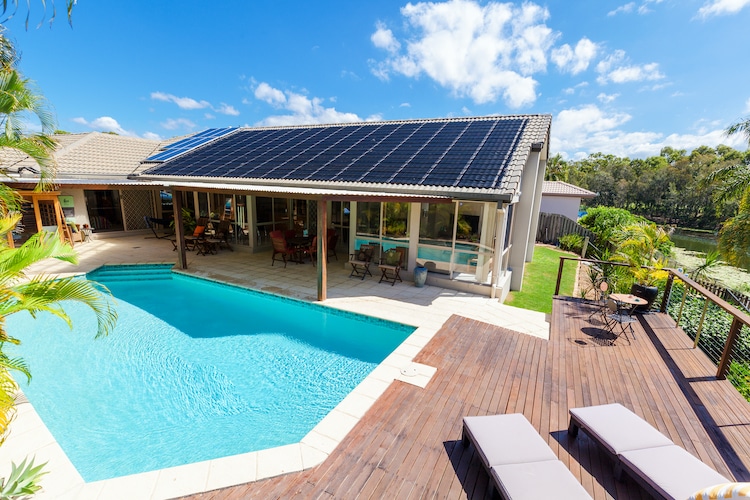Selling a House With Solar Panels
While solar panels usually increase the value of a home, they can also complicate the selling process, especially if you lease them. Here’s what you need to know about selling a house with solar panels.
The cost of solar energy is rapidly declining, falling 82% since 2010. That’s good news for homeowners who want to reduce their carbon footprint and save money on energy costs. But is it harder selling a house with solar panels? That depends.
First, know that adding solar panels to your home can increase its value if you own the panels outright. Depending on buyer needs in your area, solar panels could increase demand for your home. This could net you higher-priced offers when you sell. In fact, homes with solar panels sell for 4.1% more on average, according to Zillow research. A 2015 report from Lawrence Berkeley National Lab found that buyers are willing to pay an average of $15,000 more for a home with solar panels. Many buyers will pay more upfront for substantial energy savings later on. Moreover, houses with solar panels tend to have other features homebuyers want.
While a house with solar panels might be more attractive than traditional energy homes, it might alienate some buyers, too. If you lease your solar panels, many buyer won’t want to take over the lease. You can mitigate these concerns by explaining the benefits of solar panels in your listing and marketing materials. It helps to focus on both the environmental impact and financial implications for homeowners.
Read More: Most Popular Home Features by State
Solar Panels and the Environment
Solar panels produce clean energy that doesn’t cause harmful greenhouse gas emissions. Because solar panels do not rely on fossil fuels, they help reduce air pollution. Water isn’t necessary for solar energy systems to operate either. So the production of solar energy doesn’t deplete the earth’s water supply, nor cause water pollution.
Cleaner air and water contribute positively to public health. In the long run, a cleaner environment can reduce the nation’s healthcare costs and create jobs in the renewable energy industry. These are strong selling points for many buyers today. Consider highlighting environmental, health, and economic benefits when showing your home.
Maintenance Concerns

You may need to educate potential buyers about the maintenance required on solar panels. Many people mistakenly believe that a solar energy system is harder to maintain. In fact, it just requires a good cleaning every two to three months. Homeowners can do the work themselves or hire a solar installer to clean the panels at regular intervals.
Let potential buyers know if you used a reputable solar company for the installation, especially one that guarantees its craftsmanship. This helps calm buyers’ fears about repair costs down the road. Typically, the inverter, which is the part of the system that most frequently has issues, has extended warranty coverage. Solar batteries often come with warranties as well. Damage to other components is rare, so let potential buyers know there’s little cause for concern.
See also: Home Maintenance Guide: Utilities
Financial Implications for Buyers
Solar panels reduce your monthly energy costs between 70% and 100%, resulting in impressive lifetime savings that offset the cost of installation. (If you’re curious about the long-term savings potential of adding solar panels to your home, you can get an estimate from Project Sunroof.)
In most states, if your solar panels produce more energy than you need to power your home, you can get energy credits from your utility company to help cover the cost of electricity during darker times of year. This is known as net metering. You’ll also receive Solar Renewable Energy Certificates for every 1,000 kilowatt-hours your system produces, which you can register and sell to earn extra income.
Selling a House with Leased Solar Panels
If you lease your solar panels, some buyers will see that as taking over a cost rather than inheriting savings. The buyer will still save money on energy costs each month, but the savings will be minimal when compared to an owned solar panel system. Having an active lease on your solar panels can even drive down the sale price of your home or impact the buyer’s ability to get a mortgage. If you lease your solar panels, you have a few options for how to proceed when it comes time to sell.
- Advertise the savings: Present the cost savings opportunity to buyers in your marketing materials. Explain how the cost of the lease is offset by your energy savings. Tell buyers that electricity costs continue to climb, while your monthly lease payments are fixed. However, if you’re going to transfer the lease, the buyer will need to meet the solar company’s credit requirements. It’s also a good idea to work with a real estate agent or attorney who has experience with solar panel lease transfers.
- Buy out the lease: If you have the budget to buy out the remainder of the lease, this will probably be your best option in terms of achieving a higher offer price and a quicker sale.
- Sell your house off-market: If you can’t afford to buy out the lease or make necessary repairs to the property, selling off-market is probably your best bet. Some off-market buyers may be deterred by a solar panel lease, but an investor offering cash might be willing to buy out your lease. You can also get a range of offers from Sundae’s marketplace. An investor from our marketplace can buy out your lease, and Sundae will offer eligible sellers a $10,000 cash advance after your inspection, should you need it. Plus, you won’t have to hire a real estate agent, remodel your home, or pay closing costs.
Related articles:
Ready to Get Started?
Sell as-is. Pay zero fees to Sundae. Move on your time. No repairs, cleanings, or showings.